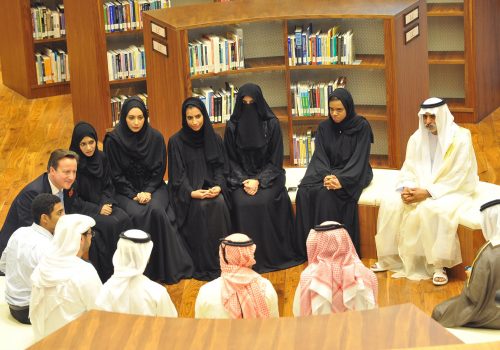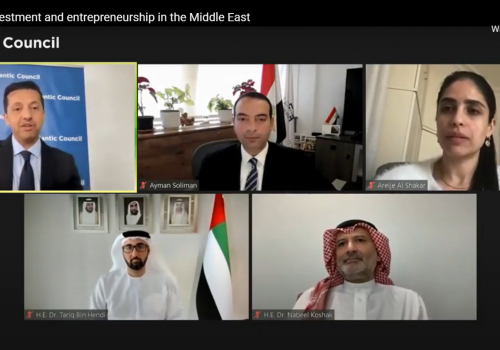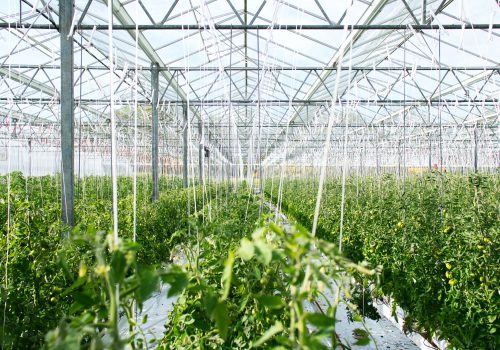Emerging market investments are shrinking. How will MENA countries hit FDI targets?
As the pandemic-fueled liquidity begins to wane and the reality of inflation and higher interest rates sets in, many economies will face considerable challenges. Middle East and North Africa (MENA) countries are vying to attract global investors and increase Foreign Direct Investment (FDI). Yet, capital flows are reversing from emerging to developed markets—specifically in the United States, where interest rates are rising to levels not seen since 2018. The year 2018 is illustrative: during that time, emerging markets experienced substantial capital outflows as international investors reduced their exposure and consolidated their risk into emerging economies with fewer perceived risks, given their proactive and progressive economic policies.
Attracting foreign investors into emerging market economies has always been difficult. Nevertheless, thanks to the extended period of near-zero interest rates, emerging markets were blessed with investors hungry for higher returns. The plentiful supply of money coupled with historically low yields in rich countries led investors to explore higher yields in riskier markets across various assets, including public equities, public debt, private equity, and venture capital. The lower cost of capital allowed investors to finance opportunities that otherwise would have been unfeasible.
Unfortunately, the party is over, and the pain is just beginning. The US Federal Reserve has started an aggressive interest rate hiking campaign, which will likely be the sharpest rise in interest rates since former chair of the Federal Reserve Paul Volcker’s war on inflation from 1979 to 1982. Many economists believe this will likely lead to a recession in the world’s biggest economy.
A US economic slowdown or a recession couldn’t come at a worse time for emerging markets, particularly those in MENA, where most are fighting chronic unemployment, especially among youth and women, slowing growth, and higher debt levels. Large oil-exporting countries in the Gulf Cooperation Council (GCC)—such as Qatar, Saudi Arabia, and the United Arab Emirates (UAE)—are better positioned given heightened commodity prices. However, their lack of interest rate autonomy given the dollar peg limits their ability to deviate their monetary policy from that of the United States.
Additionally, the global demand destruction cannot be ignored as the post-pandemic surge in demand levels off, with consumers beginning to feel the pinch from inflation and rising interest rates. This may put a damper on global energy demand and tourism. Inflation also impacts global emerging markets, causing a perfect storm for the arrival of tough economic times. Currency depreciation against the dollar is increasing the cost of imports and repaying foreign currency debts for banks, companies, and governments, many of which racked up significant debt during the pandemic.
Research suggests that the impact of US monetary tightening on emerging markets will vary depending on the factors for the change. Interest rate hikes driven by US economic expansion will likely lead to positive spillover effects that benefit more than hurt emerging markets and, therefore, are neutral on capital flows. On the other hand, interest rate hikes to fend off inflation will likely lead to emerging markets disruption. Here, there are two key points to mention. First, there is a more significant effect on emerging markets from rising interest rates due to inflation than those due to growth. Second, emerging economies with stable domestic conditions and policies tend to fare better and experience less volatility. In a global economic environment with slower growth, higher cost of capital, and a shrinking capital pool for riskier assets, discerning international investors will consolidate their investments in the highest-quality emerging markets.
The Goldilocks moment experienced in markets over the past couple of years is subsiding. Geopolitical risk, inflation, and US interest rates are all rising. In addition, two crucial macroeconomic trends will impact the future capital flows to emerging markets. First, globalization policies that have focused overwhelmingly on cost efficiency and rationalization will now focus on resiliency and values-based investments. At an Atlantic Council event on April 13, US Treasury Secretary Janet Yellen articulated a blueprint for US trade policy, stating, “The US would now favor the friend-shoring of supply chains to a large number of trusted countries that share a set of norms and values about how to operate in the global economy.”
Second, Environmental, Social, and Governance (ESG) issues are gaining more attention with countries and companies putting them on the agenda. For an indication of what’s to come, consider Total, the French oil and gas giant, marking its shift to renewable energy and rebranding to TotalEnergies, as well as Engine No. 1, a US impact hedge fund, hijacking ExxonMobil’s board to drive a green strategy at the company. As a result of the confluence of these complex issues on top of challenging macro-economic concerns, investor appetite for emerging market assets is weakening. It will become more discerning in the coming years.
But all isn’t lost. There will be divergent outcomes and risks depending on the domestic conditions of each emerging market. Thoughtful investors will continue to seek opportunities in emerging markets, especially in private markets, where the predominant share of opportunities exists. However, as financial conditions tighten, differentiation between emerging markets will increase. MENA countries can better position themselves amongst others competing for capital by:
- Attracting and empowering strong policymakers to make dynamic and bold decisions that complex changes in the global economy require. Deepening the bench of talented policymakers should be another priority.
- Driving policies supportive of private sector development and investment. Reducing government-owned enterprises and providing ample space for private companies to grow and prosper on an even playing field is critical to building a dynamic economy.
- Continuing to nurture the nascent entrepreneurial ecosystem. Entrepreneurial economies are consistently more resilient and lead to better outcomes over the long term.
- Enhancing regional and international economic integration through bilateral and multilateral agreements with more robust economies. Proactive engagement with multilateral financial institutions will also increase financial stability and resilience.
- Standardizing policies according to global norms for greater regional and international integration. Investor appetite is greatly improved in emerging markets that adopt regulations and standards from developed countries.
- Increasing transparency and reducing uncertainty around laws and regulations. Investors and companies need more clarity on the game’s rules in order to play it confidently and competently.
Several MENA countries continue to take bold steps to improve their global competitiveness. One such example is the privatization programs of government-owned enterprises in Egypt, Saudi Arabia, and the UAE to increase liquidity in local capital markets, improve transparency, and expand private sector participation. Those countries that maintain their momentum will be clear winners in the coming years. History is rich with evidence that economic challenges are followed by periods of historic gains.
Amjad Ahmad is Director and Senior Fellow at the Atlantic Council’s empowerME Initiative at the Rafik Hariri Center for the Middle East. Follow him on Twitter: @AmjadAhmadVC.
Further reading
Tue, Sep 29, 2020
Absence of PhD programs contributes to weak research and development in the Gulf
MENASource By
The production of new knowledge is a very complex process and many factors contribute to the low levels of innovation exhibited by the Gulf countries. One factor that plays a role is the structure of tertiary education—particularly PhD programs.
Thu, Mar 25, 2021
‘It’s not a zero-sum game’: MENA officials agree that regional integration is key to growth
MENASource By
Atlantic Council’s empowerME initiative and the King Faisal Center for Research and Islamic Studies co-hosted an event that discussed strategies for building regional cooperation to create a more attractive investment landscape and productive entrepreneurial ecosystem. These are some key takeaways.
Fri, Jun 11, 2021
Can AgriTech entrepreneurs save the Middle East’s food supply?
GeoTech Cues By
On June 9, the Atlantic Council’s GeoTech Center and empowerME Initiative hosted a private, on-the-record roundtable. Read the key takeaways.
Image: An investor walks through the Dubai Financial Market after Joe Biden won the U.S. presidency, in Dubai, United Arab Emirates November 8, 2020. REUTERS/Christopher Pike


